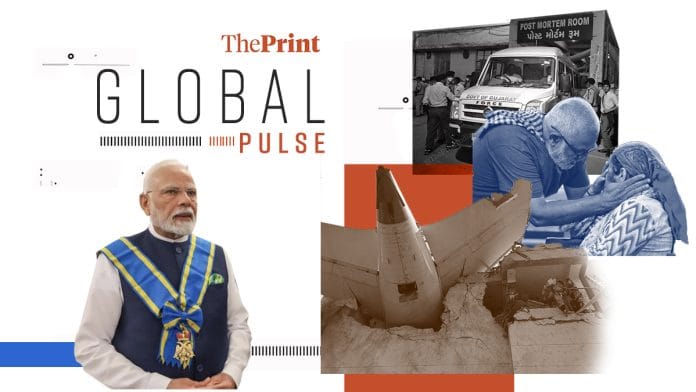New Delhi: In order to piece together what happened, American investigators have reached the scene of the fatal crash of the London-bound Air India flight, report Anupreeta Das and Pragati K.B. in The New York Times.
“The investigators, from the US National Transportation Safety Board, are conducting ‘a parallel probe under international protocols since the aircraft is American-made’, the Indian government said in a statement late Sunday,” reads the report.
Financial Times doubts the “efficacy” of the “high-level committee” that has been tasked with probing the reasons behind the crash.
“To me it sounds more like a bureaucratic, knee-jerk response. What is it going to propose that is not already part of India’s emergency response protocol? And if such a committee could ensure tragedies like this do not happen, why was it not set up earlier?” writes Veena Venugopal in the India Business Briefing newsletter.
Meanwhile, UK citizens who lost their loved ones to the crash continue to struggle to find the remains of the deceased. They are now accusing their government of “abandoning” them, and are questioning its response––which grieving families describe as “disjointed, inadequate and painfully slow”, reports Rachel Hall in The Guardian.
“The family members are urging the government to immediately deploy a full crisis team at the hospital, including consular, medical, and forensic science officers, as well as implementing a British-run identification unit to assist with DNA testing and speed up the release of remains,” the report says.
Some families have gone on to say that they also want hourly briefings from both countries, and financial support to cover travel and accommodation in India.
The Economist looks at Prime Minister Narendra Modi’s third term in power so far, presenting both sides––what has worked in his favour and the challenges ahead.
“In some respects things are going reasonably well, including the economy,” it notes, referring to the most recent quarter growth of 7.4 percent year on year, the low current-account deficit at 1.1 percent of GDP, Bharatiya Janata Party’s “legislative victory” of pushing through a “contentious law on Muslim endowments”, and the strikes against Pakistan in the recent conflict.
However, the article asserts that the BJP government’s “appetite for bold reforms has waned”.
“Mr Modi and his party are suffering from a lack of imagination. After 11 years in power, the BJP appears to be running out of ideas,” the article reads. “What is Mr Modi’s priority for the remaining four years of his term? That is still an open question but there are some signals. On June 4th the government announced it would hold a long-delayed census in 2027.”
Modi’s two-day trip to Cyprus before heading to Canada for the G7 summit has resulted in the two nations stepping up defence ties and the beginning of “cybersecurity cooperation and maritime trade,” reports the Associated Press.
“Cyprus figures to act as the linchpin between India, the Middle East and Europe in the trade, energy and digital connectivity corridor, given the island nation’s geographical location as the nearest European Union country to the Middle East and India,” it says.
(Edited by Mannat Chugh)






